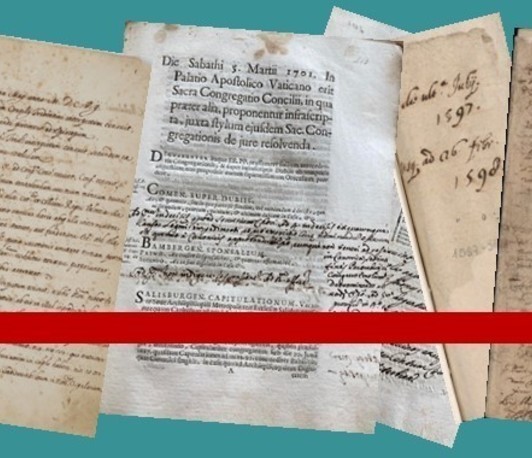The decrees of the Roman congregations from the archives to the web. Experiments in data modelling with a view to interoperability
Workshop
- Date: Apr 23, 2024
- Time: 09:30 AM - 03:30 PM (Local Time Germany)
- Location: Turmcarrée
- Host: Benedetta Albani (mpilhlt)
- Contact: albani@lhlt.mpg.de

The systematic issuance of decrees by the permanent cardinals' congregations of the Roman Curia undoubtedly marked an important turning point in the normative production of the Apostolic See, in the conduct of internal decision-making processes within the curia, in the definition of relations with local institutions and actors. Additionally, it contributed to the evolution of Canon Law in the early modern and contemporary age. New research groups, recent scientific projects and publishing initiatives show the renewed interest in these topics in recent years. This workshop is part of the initiative “An innovative experience of normative production. The decrees of the Roman congregations and their potential in legal-historical research” organised by Benedetta Albani (Research Group Normative knowledge in the praxis ofthe Congregation of the Council. The production of normative categories andmodels for the post-Tridentine world, mpilhlt), Matteo Al Kalak (Research Group “Digital Inquisition. Tools for Multimedia Access and Exploitation of the Archive of the Congregation for the Doctrine of the Faith” PRIN 2022), Nicoletta Bazzano, Vittoria Fiorelli and Massimo Carlo Giannini (Research Group “Netex. NETworks and EXchanges within the Congregations of the Roman Curia: a Digital Analysis of the Early Roman Church Archives” PRIN PNRR 2022).
The seminar focuses on the application of innovative approaches for modelling data on decrees of Roman congregations, with the aim of improving interoperability between research projects. We will explore the challenges and opportunities in modelling decrees data, discussing how we can accurately and comprehensively represent such data in a conceptual model. We will also examine strategies for functionally comparing the different data models used for decrees of Roman congregations, exploring tools and resources that can facilitate this comparison. We will also present approaches for designing interoperable tools that enable smooth transitions from one project to another and link decrees to other decrees or related events. Finally, we will address the challenge of linguistic plurality in the sources and our digital tools, exploring how to effectively manage this linguistic diversity to ensure accurate data accessibility and interpretation. The aim of the seminar is also providing a solid basis for future developments and interdisciplinary collaborations in historical and digital research.
The workshop is also open to other research groups and scholars. However, given the specific nature of the topics and discussion, we encourage the participation of persons and groups actively involved in investigation related to the decrees of the Roman congregations and data modelling in the specific legal-historical context outlined above. For more information, and to propose your participation (in-presence or online), please write to Benedetta Albani albani@lhlt.mpg.de.